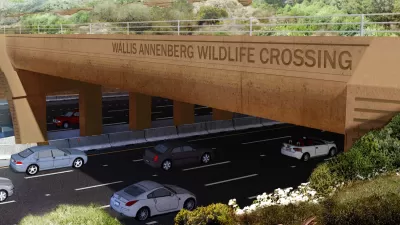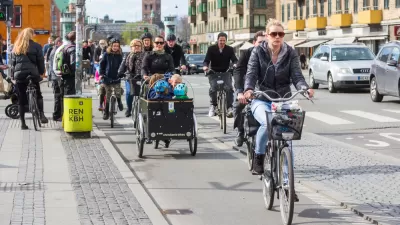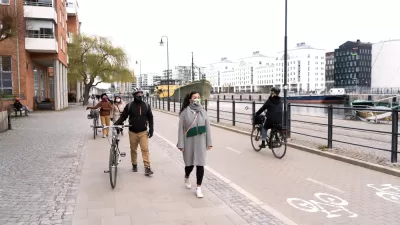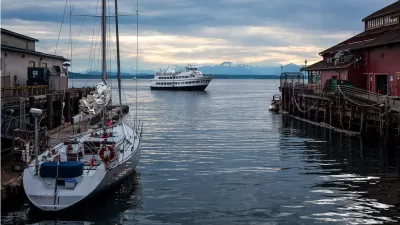Copenhagen is often cited as the world’s most livable city—a city characterized by bicycles and shared open spaces. But the road to get there has required compromise among politicians and an active and engaged community.

Copenhagen has been called the world’s greenest and most livable city, and it has the added benefit of being capital of the world’s happiest country, Denmark. Writing in Next City, Feargus O'Sullivan finds that the ascendancy of Copenhagen hasn't been as smooth as many believe and additional challenges on the horizon, including a dearth of affordable housing remain a problem for the city.
Right now, for example, Copenhagen is considering a new harbor tunnel that, if built, could end up flooding the city center with cars. Growth in housing demand is galloping ahead of home building, causing higher-than-ever housing costs. Some key housing schemes built so far have made some missteps and predominantly targeted the already well-served rich.…
The urbanism movement’s model city is not immune to the challenges of growth, climate change and increasing economic disparity.
Where Copenhagen has succeeded is in the willingness of its leaders to seek compromise, an outcome of the country's multi-party system. Proposals won't survive unless, as O’Sullivan writes, "their arguments aren’t backed up by data." Risk taking and engagement inside and outside of government is also cited as one of the city's strengths. Progressive activists have rallied to save open space and force better bicycle infrastructure, while one city engineer worked to reduce parking in the city through "stealth urbanism." O'Sullivan provides this interesting anecdote from Copenhagen architect Jan Gehl.
“For many years, Copenhagen had an excellent city engineer who said ‘if you can’t park, you don’t drive.’ Then he said ‘I’ll take 2 percent of the parking out of downtown every year, and I won’t tell anybody so nobody will notice.’ So every year, he reduced the amount of parking space and put in more tables, more chairs,” Gehl recalled at a forum hosted by The Atlantic in October. “The place became nicer and nicer, and people changed their habits, taking their bikes or the bus or metro. Over a period of time, the pattern of behavior has changed. You could call it stealth urbanism.”
FULL STORY: Even Copenhagen Makes Mistakes

Pennsylvania Mall Conversion Bill Passes House
If passed, the bill would promote the adaptive reuse of defunct commercial buildings.

World's Largest Wildlife Overpass In the Works in Los Angeles County
Caltrans will soon close half of the 101 Freeway in order to continue construction of the Wallis Annenberg Wildlife Crossing near Agoura Hills in Los Angeles County.

Coming Soon to Ohio: The Largest Agrivoltaic Farm in the US
The ambitious 6,000-acre project will combine an 800-watt solar farm with crop and livestock production.

California Grid Runs on 100% Renewable Energy for Over 9 Hours
The state’s energy grid was entirely powered by clean energy for some portion of the day on 37 out of the last 45 days.

New Forecasting Tool Aims to Reduce Heat-Related Deaths
Two federal agencies launched a new, easy-to-use, color-coded heat warning system that combines meteorological and medical risk factors.

AI Traffic Management Comes to Dallas-Fort Worth
Several Texas cities are using an AI-powered platform called NoTraffic to help manage traffic signals to increase safety and improve traffic flow.
City of Costa Mesa
Licking County
Barrett Planning Group LLC
HUD's Office of Policy Development and Research
Mpact Transit + Community
HUD's Office of Policy Development and Research
Tufts University, Department of Urban and Environmental Policy & Planning
City of Universal City TX
ULI Northwest Arkansas
Urban Design for Planners 1: Software Tools
This six-course series explores essential urban design concepts using open source software and equips planners with the tools they need to participate fully in the urban design process.
Planning for Universal Design
Learn the tools for implementing Universal Design in planning regulations.


























